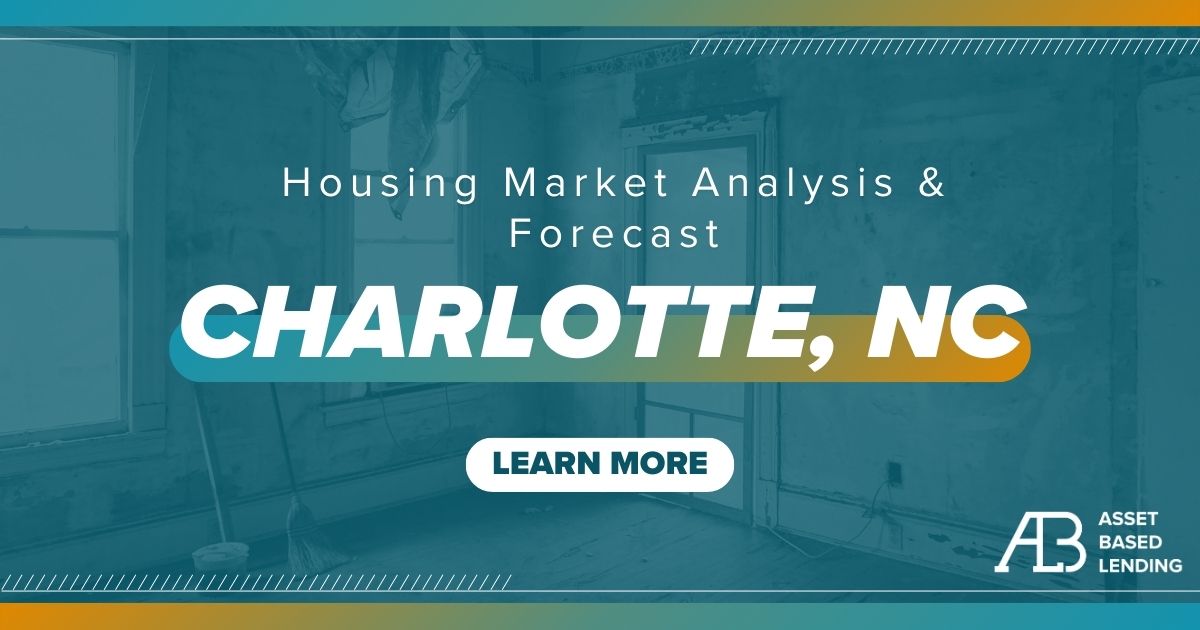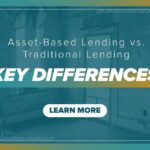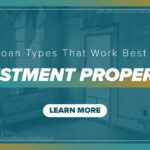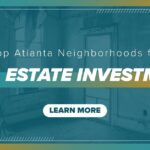Charlotte, North Carolina is one of the fastest-growing housing markets in the U.S.
Since 2020, the city’s population has grown by 47,412 to 923,164 (a 5.41% jump), making it the most populous city in the state.
Meanwhile, home values have skyrocketed. Since January 2020, the Charlotte metro’s median home listing price went from $336,675 to $422,450 (a 25.48% jump).
As a real estate investor, these are good signs. They mean housing demand is outpacing supply, and 2025 may be a good time to get your piece of the pie.
At ABL, we’ve helped many Charlotte investors flip houses and secure long-term rentals with our flexible loan programs. Set yourself up for success with a Charlotte hard money loan today.
Charlotte North Carolina Real Estate Market Snapshot
Compared to the rest of the U.S., Charlotte’s housing market is on fire. Here’s a snapshot of the current market conditions:
Housing Inventory
Charlotte has an outsized number of homes for sale.
In December 2024 (the latest available data), the Charlotte metro area had 6,698 active home listings on any given day of the month, a 7.84% drop from November 2024 (which is typical due to real estate’s seasonality) but a 33.59% jump from the same time last year. Meanwhile, active listings across the U.S. fell 8.59% since last month and grew by 22.03% since last year.
Pending Sales
Coupled with Charlotte’s relatively high home inventory is its persistent housing demand.
On top of active listings, the metro had 3,627 pending listings on any given day of the month in December 2024. That’s equal to over 54% of the active listing count. By comparison, the average U.S. pending listings comprised less than 40% of the country’s active listing count during the same period. In other words, Charlotte’s housing market is hotter than average.
Median Days on Market
Charlotte homes are selling slightly faster than they are across the rest of the U.S.
In December 2024, Charlotte’s median days on the market (the time between the initial listing of a property and when it’s taken off the market) was 63, compared to the country’s median of 70—another sign that the metro’s real estate market is relatively active.
Need to buy a house quickly to beat the competition? ABL can help you close on a hard money loan in as few as three days. Contact us today to learn more.
Home Values
Housing demand in Charlotte continues to outpace supply, pushing home values higher than the national average (and at a faster pace).
In December 2024, the median home listing price was $422,450, down 1.47% from November 2024 but up 5.61% from the same time last year. Meanwhile, the median home listing price nationwide was $402,502, down 3.45% from November 2024 and down 1.83% from last year.
6 Reasons to Invest In Charlotte North Carolina Real Estate Market
Moving forward, the Charlotte housing market is expected to continue growing. According to economists at the 2024 NAR Real Estate Forecast Summit, Charlotte will be one of the country’s top ten housing hot spots in 2025.
Here are some of the reasons Charlotte’s real estate market stands out for future growth:
- Fewer locked-in homeowners: Of all mortgage originations in Charlotte from 2019 to 2023, 79.0% had a rate below 6% (compared to 76.1% of nationwide originations). This means fewer homeowners are locked into low rates, increasing the likelihood they’ll list their homes for sale.
- Faster job growth: From October 2019 to October 2024, jobs in Charlotte grew by 10.1% (compared to a 5.0% national average), increasing housing demand and driving up home prices and rental income.
- Higher net migration: In 2023, Charlotte’s net migration (number of people that moved into the city minus the number that moved out) equaled 1.4% of the city’s population. By comparison, national net migration equaled 0.5% of the U.S. population.
- More households reaching homebuying age: The share of Charlotte households reaching homebuying age (35-40 years old) in the next five years is 11.1%, higher than the 10.0% share of U.S. households.
- Growing inventory of starter homes. The share of Charlotte homes that are starter homes (those priced 85% of the city’s median home price) is 43.5%, making homeownership more accessible to a growing number of first-time buyers.
- Faster home price appreciation. Between Q3 2019 and Q3 2024, Charlotte home prices rose 72.8% (U.S. homes rose 53.5%), indicating a strong market with high return potential. For example, home flippers who use ABL’s fix-and-flip loans could make an attractive profit.
Job and Infrastructure Growth in Charlotte
Driving much of Charlotte’s housing boom is its thriving economy and infrastructure expansion.
Charlotte Economy
In 2023, the Charlotte metro area had a gross domestic product (GDP) of over $255 billion, up from $190 billion in 2020 (a 34% jump). Here are some of the city’s top industries and corresponding employers (including 18 Fortune 500/1000s):
- Advanced Manufacturing: Daimler, Nucor, Albemarle, Coca-Cola, Siemens Energy
- Financial Services: Ally, Bank of America, LPL Financial, Truist, Wells Fargo
- IT/ Technology: AvidXchange, Dualboot, Honeywell, Lendingtree, Lowe’s
- Life Sciences: Atrium Health, Dentsply Sirona, Lilly, Novant Health, Premier
- Logistics & Distribution: RSM, Amazon, CSX Transportation, Macy’s, TTX
As Charlotte’s economy continues to grow, it will attract workers from all over. This could raise housing demand, increasing rental rates and home values across the board.
Charlotte Infrastructure
To accommodate the city’s rapid growth, Charlotte government officials have big plans to expand local infrastructure.
For example, the city has a 2030 Transit Plan to expand public transportation options and a Capital Investment Plan (CIP) to address other infrastructure needs. Recently, the city also secured $31.4 million in federal grant funding for various infrastructure projects, which could accelerate the city’s growth and push real estate values higher at an even faster rate.
Top Charlotte Neighborhoods for Real Estate Investors
Within Charlotte, some of the most popular neighborhoods include:
Ballantyne West
Located on the border with South Carolina, Ballantyne West is a residential neighborhood near grocery shopping, city parks, and pickleball courts. Homes here sell 1.75 days faster and are 39% more popular than surrounding homes, according to Realtor.com.
Highland Creek
Highland Creek sits on the north side of Charlotte along Interstate 485 (aka the Charlotte Outerbelt). It’s a great neighborhood for families as it has multiple schools nearby, including elementary schools with above-average ratings.
Back Creek Church Road
Back Creek Church Road is an up-and-coming Charlotte neighborhood with a lot of recent and current development. It’s also located near a 927-acre nature preserve called Reedy Creek Nature Center with fishing and hiking opportunities.
Coulwood West
Named after Coulwood Park, Coulwood West is a popular residential neighborhood with lots of room for growth. It’s also home to Paw Creek Elementary School, which has an above-average school rating.
Provincetown
Provincetown is a residential neighborhood with something for everyone: a city park, multiple schools across all grade levels, and a giant commercial center nearby.
Prosperity Church Road
Prosperity Church Road is a large neighborhood near University City, one of the country’s largest research parks with over 2,200 acres and 11.5 million square feet of office space. It attracts workers from all over the country, raising nearby housing demand.
Silverwood
Located on the east side of Charlotte, Silverwood is an up-and-coming residential neighborhood with recent and current housing development projects. Real estate investors who build here may benefit from future growth as new residents move in.
Myers Park
Myers Park is a high-end neighborhood with a median home listing price of $887,500. It’s also home to a large golf course and a small private university called Queens University of Charlotte.
Tips for Investing In Charlotte Real Estate
Below we’ve rounded up our top tips for investing in Charlotte real estate:
Focus on High-Growth Areas
Some areas of Charlotte have more return potential than others. For example, Mooresville (a suburb of Charlotte) was recently named the fastest-growing suburb in America with home values under $500,000.
Check Local Regulations
Before committing to a property remodel, check local zoning regulations and apply for necessary permits. You can find Charlotte’s zoning ordinances and permitting requirements at the city’s government website.
Secure Funding
Unless you plan to pay for a property with cash, you’ll likely need a real estate investment loan. ABL offers a variety of loan programs that can be tailored to your project.
Conduct Due Diligence
Never buy a property without thoroughly inspecting its condition and market value, which typically involves hiring a professional home inspector and appraiser. That way, you don’t overestimate the property’s value or underestimate repair costs.
Prioritize Renovations with the Highest ROI
When flipping homes, focus on improvements that will drive the most return. For example, according to the 2024 Cost vs Value Report, renovation projects with the highest ROI potential in Charlotte include steel entry door replacements (198.9% ROI), garage door replacements (189.5% ROI), and manufactured stone veneer (150.2%).
Partner with Local Experts
Finally, consult other real estate professionals. Partner with local agents, attorneys, title professionals, insurance providers, and private lenders who can help you finalize the deal. Real estate transactions can be complex and it’s important to have the right team on your side.
Get Started With ABL Funding
Once you’re ready to invest in Charlotte real estate, connect with a local ABL loan officer. Interested in other areas? No problem. See where we lend here.
Whether you want to buy a long-term rental or do a flip, we can help. Our loans have funded countless projects just like yours. Pre-qualify today with no strings attached!
Note on sources:
- Data on Charlotte’s housing inventory, pending sales, median days on the market, and home values taken from Realtor.com® Economic Research (unless otherwise cited).







0 Comments